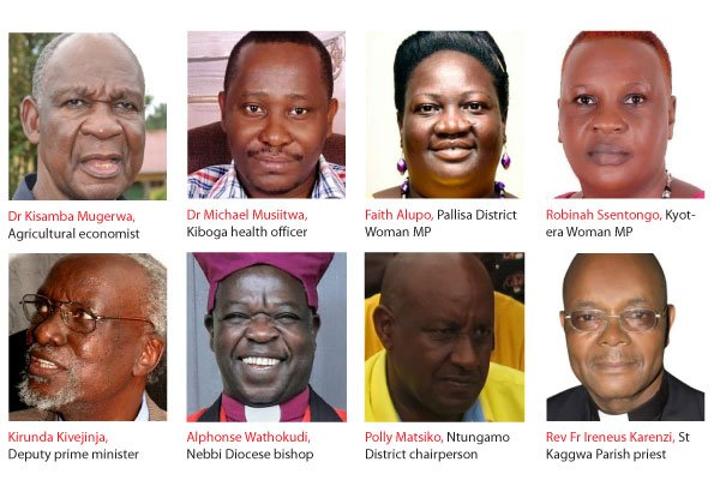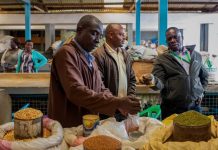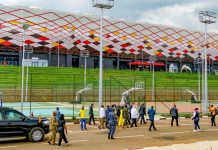Africa-Press – Uganda. A year after Covid-19 broke out in Uganda, the country has lost at least 334 lives to the pandemic. Many remain in hospital and thousands are battling the after-effects of the disease, including stigma. The disruptions to life and livelihoods are massive. In a new series starting today, we celebrate the lives lost, the continuing sacrifices and courage of health workers and resilience of citizens. In this first instalment, Nobert Atukunda explores the distresses of lockdown and recounts the shock, panic and chaos that greeted the first Covid case
.
In Uganda, almost every official measure to prevent the spread of Coronavirus began with a 32-day limitation.The country witnessed a shutdown of schools and worship places, and the ban on bars, gyms and hospitality facilities, including hotels.
The brakes also applied on public transport and use of private cars.
Boda boda movements were also suspended except for cargo transportation and within a 2pm stop time.The introduction of movement chits, which until then were applicable for livestock transfers across jurisdictions, caused chaos.
The permits for people’s emergency trips such as taking a patient to hospital could only be issued by a Resident District Commissioner (RDC), who was nearly inaccessible for many citizens.
The long-abandoned roadblocks returned. Then the imposition of a 7pm curfew drew jitters after Local Defence Unit (LDU) personnel implementing it shot at civilians and indiscriminately flogged civilians, including family members found outside their house at dusk, for instance, in Masaka.
In the first week of July 2020, a couple of LDU personnel and a soldier reportedly roughed up Mr Joseph Luzige, the elected chairman of Mityana District, as he intervened to restrain the security men from brutalising his electorate in the name of curfew, among them a woman with a fractured leg.
The British Broadcasting Corporation (BBC) reported in the same month that Ugandan security forces enforcing lockdown rules had allegedly shot dead at least a dozen civilians even before the pandemic claimed a single life in the country.
Among the fatalities was Merrytime Primary School headteacher Eric Mutasiga and a father of three, who was shot during an encounter as he tried to secure release of his worker, the BBC reported on July 23.
In Kampala, and towns that had teemed with multitudes amid booming businesses were abruptly deserted, hotels and clubs emptied.
The closure of schools meant 15 million students had suddenly to return home while many work places closed, employees asked to work from home amid erratic Internet and regular power outages.
A number of companies, including banks and media houses downsized, adding a layer of agony in a distressed Covid-19 situation.
Individuals that lived hand-to-mouth found their backs against the wall.
Many could not put food on the table, sparking domestic squabbles and fights that, as media reports showed, spiralled into domestic conflicts and killings.
Food distributionsThe government intervened with food distribution in Kampala and Wakiso districts, but hundreds of households never got maize flour, beans and cooking oil rations.
In gated communities and dark hut corners, young girls were sexually abused by relatives and older suitors, resulting in teenage pregnancy cases over the past year that run into thousands across districts. It’s an epidemic within a pandemic, one President Museveni argued was bad, but not fatal which would have been the case had Covid-19 found the girls huddled at educational institutions.
In the run-up to the lockdown, everything in the country was tense and official and personal narratives echoed panic and chaos.
Elsewhere in Italy, the United Kingdom and the United States, the virus believed to have originated in Wuhan, China, wreaked havoc and its patients quickly overwhelmed hospitals.
As daily deaths from coronavirus in developed countries surpassed the 1,000-mark, grim predictions for African countries, where health infrastructure is generally weak or limited, flooded.
In Uganda where drug stock-outs are frequent, hospital bed capacities limited and guardians routinely buy medicines and health commodities for patients in admission at private pharmacies, fear was palpable about what would happen in the event Covid-19 broke out in the country.
Ms Melinda Gates, the co-chair of the Melinda & Gates Foundation which does cross-sector work on the continent including in health sector, added to the unease with an apocalyptic forecast – a horrible unfolding of coronavirus in Africa where dead bodies would litter streets.
“There was the scare of the unknown,” Dr William Worodria, the first head of the national Covid-19 case management, said yesterday.
By the time the World Health Organisation (WHO) declared coronavirus a global pandemic on March 11, 2020, Uganda had not registered any case, leading some sceptics to question the existence of the virus.
Then on March 18, 2020, President Museveni delivered a nationally-televised first address about the pandemic after a meeting earlier in the day during which he briefed religious leaders and security honchos about impending draconian measures.
The President declared that the pandemic was a war in which liberties will have to be sacrificed for survival.
The country was going into a total lockdown, there would be no inter-district movements and dusk to dawn curfew would be in place, enforced by a cocktail of security agencies.
Schools would close within two days as would churches, mosques and temples and there would be no passenger service vehicles or privately-owned cars on the road while Entebbe International Airport would stop operations within 48 hours.
In addition, citizens were clustered into essential and non-essential workers, with the former that comprised health workers, security operatives and journalists authorised to continue plying their trade.
From fears of sudden job losses to uncertainty about the future, fear and a sense of helplessness pervaded the country. A one Nassali, a former hotel employee and resident of Sseguku in Wakiso District, who lost her job, began retailing alcohol door-to-door, taking advantage of closed bars.
“Imagine they told us they would call us back, but for how long were we supposed to wait when the landlady wanted her money, when you need food. Even those who were allowed to work, they cut the salary … [from] Shs 500,000 to Shs150, 000,” she said.
Many caught without money to survive the lockdown trekked long distances, among them a group that walked 520 kilometres from Kampala to Arua, to their villages where life is affordable or more tolerable without cash.
The first caseThree days after President Museveni’s address, Health minister Ruth Aceng at a press conference announced the confirmation of the first Coronavirus case in Uganda – a 36-year-old businessman who had returned to Kampala from Dubai in the United Arab Emirate.
In the laboratory at Uganda Virus Research Institute (UVRI), where the tests were being run, one official said fear and panic engulfed the facility.
“There was a cloud of fear and panic from top to the bottom … people now knew that Covid-19 was in the country and it could catch or kill anybody any time,” the employee said on condition of anonymity due to lack of authority to speak to the media.
Bio-safety and bio-security measures inside the facility were tightened, management rotated staff working days and enforced wearing of protective gear at all times, and banned visitors.
On social media, users berated and insulted the index case, accusing the man of endangering the nation for selfish profit motive.
One social media user suggested that since the individual was the first and only case, he should be killed so that the virus is eliminated in the country.
By last Saturday, the man, whom we are not identifying at his request, said he was still traumatised and unwilling to share his experience because “I accepted what happened to me…it’s now all in the past”.
The confirmation of Covid-19 ended Uganda’s clean run for months of no infection pandemic, which was ravaging developed nations.
It was a feat Uganda was unlikely to hold for long as landlocked country amid vulnerabilities presented by cross-border interactions for trade and among people of common heritage.
Indeed, truck drivers from mainly Kenya and Tanzania, the two countries that offer Uganda the gateway to the sea, became sources of Covid-19 cases in Uganda.
Their samples would be taken at the border point and sent for testing in Entebbe, resulting in delays lasting two or more days during which the trucker would have plied hundreds of kilometres inland.
The government only reversed its policy of allowing drivers in without ascertaining their Covid-19 status, under pressure from sections of a horrified population that became hostile to, and attacked, drivers whenever they camped to rest and get food.
Besides, some had families and liaisons in Uganda, meaning they mixed with natives on the highways and trading centres.
And when a result turned positive for Covid-19, a health ambulance and police patrol vehicle, both blaring loud sirens would be dispatched at break-neck speed to intercept the driver, often a day or more later.
Transportation of Covid patients
Armed police would cordon off the site and health workers in protective gear would intensively spray both the vehicle and the driver and shift him into the ambulance that sped away.
The de facto capture and bundling of truck drivers, worsened by reports of the death of thousands in countries such as Italy, the United Kingdom and Spain, fashioned a fear about how deadly Covid-19 was.
This triggered stigma in ways that individuals who tested positive, and their relatives, either lived in denial or kept hush-hush anxious that they would be shunned by others if they knew of the status.
Ms Laura Nagasha was among first people to test positive for coronavirus.
By her accounts, it was troubling because the disease alienated her from friends but it also gave her opportunity to sieve out those willing to associate only in good times. “For us who got it in the beginning, it was scary [since] the disease was new,” she said, suggesting that Covid-19 patients are more likely to confide in survivors.
The origins of the disease in China made Chinese nationals in Uganda a target, forcing some to flee although they were caught in Zombo District before crossing into the DR Congo. A few days after the first Covid-19 case, health workers undergoing training at Mulago National Referral Hospital were ambushed by the arrival of dozens of men and women who had returned from Dubai apparently on referral without consultation by a ministry of Health official.
Initially, the government had trained staff at Entebbe Regional Referral Hospital that is close to the international airport and was considered first point of call for suspect Covid cases.
With the flood of Dubai cases, Mulago health workers abandoned the training and began screening the individuals but delays to take them to quarantine centres stirred a rowdiness. Some of the scared medics denied they had undergone training so that they could avoid touching people turning up for Covid screening.
And guards at the health facilities wobbled. In some cases, protective gear was inadequate.Dr Rosemary Byanyima, the deputy director Mulago National Referral Hospital, saw all of the unfolding chaos at the facility and had to mobilise and lead from the front.
Timeline: Covid-19 one-year anniversary
March 11, 2020: WHO declares Covid-19 a global pandemic based on what the UN health watchdog called an alarming level of spread and severity of the disease, which had spread across continents.
December 2019: Officials in China’s Wuhan City report first cases of the disease that the World Health Organisation (WHO) later named Covid-19 months after it was initially referred to as Wuhan Virus.
March 18:
President Museveni delivers his maiden televised national address about the pandemic, announces a countrywide lockdown to initially last for 32 days and 13 measures to prevent the disease.
March 21, 2020:
Health Minister Ruth Aceng holds a night press briefing, confirms Covid-19 index case in Uganda, a 36-year-old city resident who had returned from a business trip to Dubai.
May 4, 2020:
President Museveni announces partial re-opening of economic activities – construction, garages, restaurants, whole-sale and warehouse businesses – 43 days after shutdown.
June 16, 2020
: Electoral Commission releases a revised 2021 election roadmap, orders campaigns to be conducted through media in line with ministry of Health-approved pandemic prevention guidelines.
July 23, 2020:
Uganda registers first Covid-19 death, a 34-year-old Village Health Team (VHT) member in Namisindwa District. A special health team starts burial of coronavirus victims.
October – December:
Covid-19 infections soar, hospitals run out of beds in Intensive Care Units and High Dependency Units. The government introduces homecare for mild cases, limits upcountry travel for festivities.
December 19, 2020
: Second Deputy Prime Minister Kirunda Kivejinja succumbs to Covid-19, becoming the highest-ranking government official to lose the battle to the pandemic which had claimed other notables, including lawmakers.
March 5, 2021:
Uganda receives first batch of Oxford-AstraZeneca Covid-19 vaccine from COVAX, a facility set up by WHO to help poor countries access the jabs. Inoculation of priority groups start on March 10.
“[When some of the health workers] realised that people out there were not getting the disease (Covid) and when they started paying them allowances, they started to come and work,” she said.
Despite some initial hamstrings and fear of the unknown, a number of doctors, nurses and other health professionals braved in wards to steady a shaky start. The response to the pandemic improved because President Museveni’s leadership and demonstrable commitment by Health ministry officials led by line Minister Ruth Aceng, clarified the direction to take, according to Dr William Worodria, who led the national Covid-19 case management from March to October 2020.
Mr Museveni within 12 days from March 18 had issued 35 dos and donts, initially to prevent the pandemic from reaching Uganda and, afterwards to limit spread. “The initial response was swift and effective until the cases became overwhelming with widespread community infections,” he said.
Ministry of Health had anticipated this as the worst scenario, according to its January 2020 Covid-19 response blueprint, but nonetheless budgeted Shs25 billion for anticipated six months of the disease.
As a result, it packed all its staff on the frontline from day one; doing surveillance, response, treatment and finance and logistics management.
With longer working hours and travels, soon the officials began experiencing burn-out and the onset of fatigue, in the absence of replacement team, and slowed action.
Then as activities for the 2021 elections began, Minister Aceng, a long career medical officer, sprinted to stand for Woman Member of Parliament for Lira City as did her juniors in their respective constituencies.
And it was on the slippery political terrain that Dr Aceng, celebrated for her strong leadership and response including shutting up an argumentative foreign guest opposed to quarantine, slipped.
She was captured moving in the company of supporters, many without masks, contrary to edict she had herself issued to stem spread of the pandemic. That notwithstanding, Uganda based on number of infections and fatalities has done well compared to other countries, in part benefiting from regular reviews by the national Covid-19 taskforce chaired by Prime Minister Ruhakana Rugunda and residual competence in managing previous epidemics.
“Our earlier investments into epidemic preparedness did help. The capacity we have built over a period of time both in infrastructure and human. The collaborations and partnerships were key,” said Prof Kaleebu, the executive director of UVRI.
Some of the early partners who offered cash, expertise and logistical support included WHO and the US Centres for Disease Control as well as its Africa counterpart.
The full extent of the pandemic unravelled from October to December when infections and deaths spiralled before dropping in January.
But it is not yet over and, according to experts, the current hiatus infections might be the calm before the storm. Dr Charles Olaro, the director of curative services at the Ministry of Health, said the pandemic occurs in waves, as seen in other countries, and implored Ugandans to continue observing the standard operating procedures.
Covid-19 measures after first case
1.Closure of educational institutions 2. Suspension of religious gatherings 3.Suspension of mass meetings such as public rallies, conferences4. Imposed travel restrictions on category one countries 5. Mandatory quarantine for Ugandans returning into the country at their own cost6.Mass concentrations such as non-agricultural work places; factories, hotels, large plantations, markets, taxi-parks continue functioning but with SOPs 7. Suspension of style weddings and introduction of scientific weddings. 8.Introduction of scientific funerals 9.Suspension of monthly markets 10.Travel advisory for those using public transport and operations must observe SOPs 11.Suspension of entertainment shows such as music shows, cinemas 12. Hygiene guidelines 13. Dietary guidelines
14. Closure of Entebbe International Airport and all other border points of entry except for cargo airplanes and trucks.15. Prohibition of pedestrians from entry into the country from the neighbouring countries.16. Suspension of public transport i.e. taxis, coasters, buses, passenger trains, among others.17. Suspension of non-food sellers in markets.18. Private vehicles limited to three people maximum per vehicle19. Ambulances, army vehicles, garbage collection vehicles to continue operating.20. Banned the movement of all privately owned passenger vehicles21. Closure of shopping arcades, hardware shops.22. Suspension of all the non-food shops (stores). Only food shops, shops selling agricultural products, veterinary products, detergents and pharmaceuticals remain open23. Operational of Supermarkets but under clear SOPs.24. Established food markets in Kampala and the other towns continue to be open while maintaining social distancing.25. Sellers in markets stopped from going home for 14 days.26. Closure of salons, lodges and garages.27. Farms, factories remain operational under the condition that owners arrange for the crucial employees to camp around the factory area for 14 days.28. Construction sites to continue if they can be able to encamp their workers for 14 days.29. The essential services such as medical, agriculture and veterinary, telecommunication, door-to-door delivery to continue operating30. Cargo transport by train, planes, lorries, pick-up, tuku-tukus, boda bodas and bicycles must continue but only with minimum numbers. Cargo air-craft was supposed to have only the crew while lorries would have not more than three persons.31. Prohibiting Uganda Revenue Authority from closing businesses on account of not paying taxes. 32. Prohibition of gatherings of more than five persons.33. Introduction of curfew34. Need for permission permits from Resident District Commisioners to use private transport to take a sick person to hospital for health emergencies.35. Boda bodas cyclists to stop at 2:00pm.
Do you have a story to tell of a loved one claimed by Covid-19 or your battle with the disease or its stigma? If so, and you feel able, please we respectfully ask you to share it with us for publication on [email protected]






